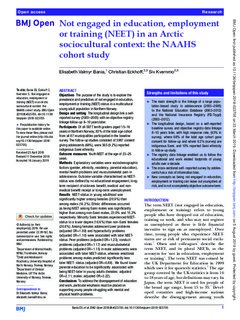| dc.contributor.author | Bania, Elisabeth Valmyr | |
| dc.contributor.author | Eckhoff, Christian | |
| dc.contributor.author | Kvernmo, Siv | |
| dc.date.accessioned | 2019-08-06T07:36:00Z | |
| dc.date.available | 2019-08-06T07:36:00Z | |
| dc.date.created | 2019-04-02T13:51:24Z | |
| dc.date.issued | 2019 | |
| dc.identifier.issn | 2044-6055 | |
| dc.identifier.uri | http://hdl.handle.net/11250/2607219 | |
| dc.description.abstract | Objectives The purpose of the study is to explore the prevalence and predictors of not engaged in education, employment or training (NEET) status in a multicultural young adult population in Northern Norway.
Design and setting The longitudinal design link a self-reported survey (2003–2005) with an objective registry linkage follow-up 8–10 years later.
Participants Of all 5877 tenth graders (aged 15–16 years) in Northern Norway, 83% of the total age cohort from all 87 municipalities participated in the baseline survey. The follow-up studies consisted of 3987 consent giving adolescents (68%), were 365 (9.2%) reported indigenous Sami ethnicity.
Outcome measures Youth NEET at the age of 23–25 years.
Methods Explanatory variables were sociodemographic factors (gender, ethnicity, residency, parental education), mental health problems and musculoskeletal pain in adolescence. Outcome variable characterised as NEET-status was defined by no educational engagement, long-term recipient of sickness benefit, medical and non-medical benefit receipt or long-term unemployment.
Results NEET-status in young adulthood was significantly higher among females (20.9%) than among males (16.2%). Ethnic differences occurred as being NEET among Sami males was significantly higher than among non-Sami males, 23.0% and 15.2% respectively. Minority Sami females experienced NEET-status to a lower degree (16.6%) than non-Sami females (20.8%). Among females adolescent peer problems (adjusted OR=1.09) and hyperactivity problems (adjusted OR=1.10) were associated with later NEET-status. Peer problems (adjusted OR=1.23), conduct problems (adjusted OR=1.17) and musculoskeletal problems (adjusted OR=1.15) in male adolescents were associated with later NEET-status, whereas emotional problems among males predicted significantly less later NEET- status (adjusted OR=0.88).
We found lower parental education to be significantly associated with being NEET-later in young adults (females: adjusted OR=2.11, males: adjusted OR=3.22).
Conclusions To address the disengagement of education and work, particular emphasis must be placed on supporting young people struggling with mental and physical health problems. | nb_NO |
| dc.language.iso | eng | nb_NO |
| dc.publisher | BMJ Publishing Group | nb_NO |
| dc.rights | Navngivelse 4.0 Internasjonal | * |
| dc.rights | Navngivelse-Ikkekommersiell 4.0 Internasjonal | * |
| dc.rights.uri | http://creativecommons.org/licenses/by-nc/4.0/deed.no | * |
| dc.title | Not engaged in education, employment or training (NEET) in an Arctic sociocultural context: the NAAHS cohort study | nb_NO |
| dc.type | Journal article | nb_NO |
| dc.type | Peer reviewed | nb_NO |
| dc.description.version | publishedVersion | nb_NO |
| dc.source.volume | 9 | nb_NO |
| dc.source.journal | BMJ Open | nb_NO |
| dc.source.issue | 3 | nb_NO |
| dc.identifier.doi | 10.1136/bmjopen-2018-023705 | |
| dc.identifier.cristin | 1689753 | |
| dc.description.localcode | This is an open access article distributed in accordance with the Creative Commons Attribution Non Commercial (CC BY-NC 4.0) license, which permits others to distribute, remix, adapt, build upon this work non-commercially, and license their derivative works on different terms, provided the original work is properly cited, appropriate credit is given, any changes made indicated, and the use is non-commercial. See: http://creativecommons.org/licenses/by-nc/4.0/. | nb_NO |
| cristin.unitcode | 194,65,35,0 | |
| cristin.unitname | Institutt for psykisk helse | |
| cristin.ispublished | true | |
| cristin.fulltext | original | |
| cristin.qualitycode | 1 | |

